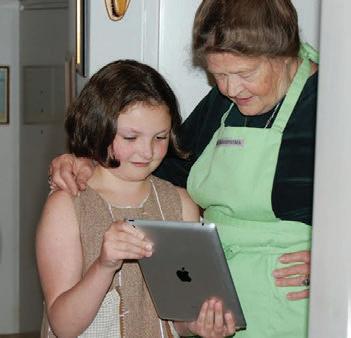
4 minute read
Haney Fellow Augusta Ambrose ’21
The Haney Fellowship was established in 1998 by William “Bill” Haney III’80, in honor of his father, the late William Haney, Jr., who lived and worked at Portsmouth Abbey School from 1968 to 1991 as a chemistry teacher, houseparent and golf coach. This creative and generous fund was established to provide Fifth Form students with a unique educational experience during the summer before their Sixth-Form year.
Students submit proposals that include a statement of purpose, a description of the program that the applicant wishes to pursue, and a documented estimate of costs. Students focus their plans on a course of study or travel/work experience that significantly furthers an existing academic interest or allows for the pursuit of a specialized opportunity. Awarded on the basis of their submitted proposals and interviews in the winter of the students’ Fifth-Form year, the Haney Fellows are chosen by Bill Haney ’80 and his mother, Irene, herself a longtime Portsmouth houseparent and valued community member.
This year COVID-19 thwarted the plans of our Haney Scholars in different ways. Augusta Ambrose ’21 describes the objectives of her fellowship and how she adapted to the pandemic challenges.
I was eleven when I heard Mrs. Helen Sperling speak about her experiences as a Jewish survivor of a Polish ghetto, Auschwitz, and a death march. I sat in a wooden pew and listened, horrified and inspired, as she urged us “to not be a bystander” to not let the evil which she saw happen in the world happen again. Mrs. Sperling recently passed away, but, thankfully, her stories will live on as people recorded her public talks. But so many other men and women from that rapidly disappearing generation that lived through the Third Reich still have stories to tell.
Alexander and Kathleen von Graevenitz are a couple in their eighties, and my family has known them for over forty years. Kathleen, born in 1933, is the child of German immigrants who settled in the Midwest. Alexander, born in 1932, grew up in Leipzig and then Bad Reichenhall, Germany. He immigrated to the United States in his twenties, where he married Kathleen, had three children, and ran a lab at Yale University. They now live in Zurich, where I visited them in the summer of 2019. During a dinner that summer he mentioned his
Augusta on a visit with Kathleen von Graevenitz in Zurich, Switzerland in 2012
childhood in pre-war, and then war-torn, Germany. I was intrigued, obviously, because here was a real live person who had lived the story that filled history books. What was Germany like for a young teenager during and after the war? How did growing up in Nazi Germany affect him in America and as a father and husband? What did his childhood and early adolescence look like? How does he remember those years? And how does he think about the questions that plague many German people today: How should we remember and atone for the sins of a past generation? How does Dr. von Graevenitz remember and think about that time, the first 13 years of his life, under Hitler’s rule?
Mrs. von Graevenitz grew up in America during WWII, the daughter of German immigrants. How did she view the war from America? What did her parents and their German community think about the events that dominated the world in the 1930s and 1940s?
The nature of my interview questions, how sensitive and personal they are, make them difficult to ask. That’s why I chose to apply for the Haney Fellowship with the intention of conducting oral interviews with Dr. and Mrs. von Graevenitz. I wanted the opportunity to ask my questions and I wanted to ask those questions in a professional and respectful way. I did not want to ask them as a curious and naive teenager who would ask uninformed and unresearched questions. Rather, I wanted to approach this professionally and respectfully, I wanted to do extensive research on the world they grew up in, and I wanted to conduct the interviews in person. After I received my Haney Fellowship I looked into travel plans for a three-week trip to Zurich, Switzerland, to interview the von Graevenitzes, and then to Bad Reichenhall, Germany to visit Dr. von Graevenitz’s childhood home. These travel plans, originally intended for August of 2020, have been delayed until the summer of 2021. The summer of 2020 was spent doing research and compiling questions to ask when I make it to Europe. I think it’s incredibly important to ask these questions in person. These questions are hard to think about, hard to answer and, I imagine, probably invoke memories of a time that was very hard to live through and to remember. I look forward to finding out what it was like for Dr. von Graevenitz growing up at the same time as Helen Sperling, but as a German Christian in Hitler’s Reich and what it was like for Mrs. von Graevenitz growing up at the same time, but as a German-American in Milwaukee, Wisconsin. Until
then, I am reading and consulting professors at Hamilton College, while I prepare my questions. I am so grateful to the Haneys and to Portsmouth Abbey for granting me this opportunity to ask these questions respectfully and thoroughly. I hope that I can record these stories so as to better understand the past, for us and future generations. And I am grateful to that late hero, Mrs. Sperling, for inspiring me and countless others. May we all try “to not be a bystander.”
-Augusta Ambrose ‘21










